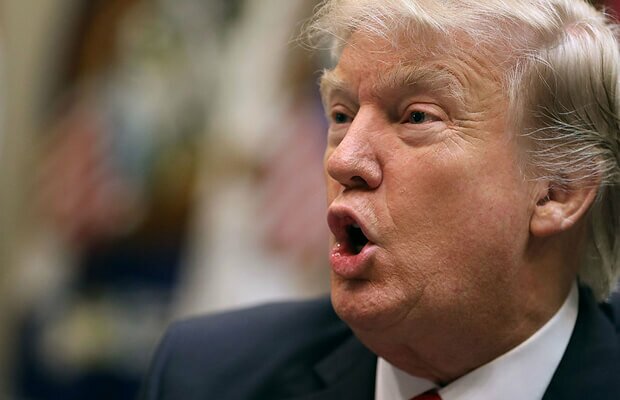President Trump Should Ignore Calls For Federal Regulation Of Online Gambling
- 05
- May

- 1 Let’s call this what it is: federal regulation
- 2 NJ to Trump: say ‘no’ to business-killing federal gambling regulations
- 2.1 Other states affected as well
- 3 A federal ban wouldn’t work
- 4 Trump’s policy on federal regulation is clear and unambiguous
- 4.1 Will Sessions break Trump’s promise?
Supporters of a federal online gambling ban are once again busy trying to make their case in Washington D.C..
These renewed efforts have caused a good deal of concern from supporters of legal, state-regulated online gaming.
They’re pushing back against federal action and calling on the administration to honor its pro-business promises and reject these new federal regulations.
Let’s call this what it is: federal regulation
The idea that the Restoration of America’s Wire Act restores anything is poppycock.
The same goes for the notion that the government needs to revisit the 2011 Department of Justice Office of Legal Counsel opinion that cleared states to legalize online gambling.
Any intervention by the federal government into legal online gambling would create new regulations that would only cause harm.
Where states have legalized online gambling, they have effectively regulated it to protect consumers, as well as create jobs and revenue.
A federal ban would undo that progress and threaten jobs, taxes, and the budget health of several states.
NJ to Trump: say ‘no’ to business-killing federal gambling regulations
Here are some of the accomplishments of the NJ online gambling industry in recent months:
- It put $35 million of tax revenue in New Jersey’s coffers in 2016.
- Operators have generated half a billion dollars in revenue since launch.
- The industry set a new record for revenue and tax contribution in March.
- Helped generate the first annual revenue increase for casinos in New Jersey since 2006.
Furthermore, because of online gambling, Atlantic City casinos are investing and innovating. This investment creates jobs and economic opportunities in the gambling industry and beyond.
The idea that the federal government could kill that progress led to a resolution introduced by New Jersey Assemblyman Vincent Mazzeo calling on the Trump administration and Congress to oppose any federal ban on state-regulated online gambling.
Mazzeo’s resolution essentially says: Don’t let the feds regulate us out of business.
Other states affected as well
New Jersey is not alone. Nevada and Delaware have successfully regulated online gaming sites without any federal involvement.
So are the Georgia, Michigan, Illinois, and Kentucky lotteries.
RAWA or a reversal of the 2011 OLC opinion would put an end to all of this and create new, sweeping federal regulations.
If either came to pass, overreaching federal regulations would take effect. This would put a tremendous burden on states and the businesses operating in them, costing both jobs and money.
A federal online gambling ban would prevent other states from following New Jersey’s lead. It would also undo everything New Jersey (as well as Nevada and Delaware) has done on this front.
In short, a federal online gambling ban would replace New Jersey’s effective regulations with ineffective federal regulations. The change would cost the state revenue, jobs, and other economic opportunities.
Not to mention…
A federal ban wouldn’t work
The federal government enacted a ban on sports betting outside of Nevada (several other states have smaller sports betting exemptions) was in 1992. The ban has done nothing to quell the appetite for betting on sports in the United States.
All it’s done is send that industry underground.
So, instead of targeted state-level regulations that work — as is the case for Nevada’s thriving sports betting industry — the rest of the country has to deal with unnecessary federal regulation that prevents states from choosing their own paths.
It’s both anti-business and a job killer.
Trump’s policy on federal regulation is clear and unambiguous
The new administration’s views on regulations couldn’t be clearer.
Throughout his successful presidential campaign, Donald Trump emphasized the elimination of what he called “destructive” government regulations.
Candidate and now-President Trump has mentioned these anti-business, employment-squashing regulatory burdens on numerous occasions.
In a speech to the New York Economic Club on Sept. 15, 2016, Trump stated:
“If we lower our taxes, remove destructive regulations, unleash the vast treasure of American energy, and negotiate trade deals that put America first, then there is no limit to the number of jobs we can create and the amount of prosperity we can unleash.”
Trump went on to say:
“One of the keys to unlocking growth is scaling-back years of disastrous regulations unilaterally imposed by our out-of-control bureaucracy. Regulations have grown into a massive, job-killing industry – and the regulation industry is one business I will put an end to.”
Will Sessions break Trump’s promise?
President Trump has continued to rail against regulations. He went so far as to create a new White House position, dubbed the “special adviser on regulatory issues.”
Trump tagged billionaire casino owner Carl Icahn for the new position in December. Said Trump: “His help on the strangling regulations that our country is faced with will be invaluable.”
Said Icahn in a statement issued by the Trump transition team in December:
“Under President Obama, America’s business owners have been crippled by over $1 trillion in new regulations. It’s time to break free of excessive regulation and let our entrepreneurs do what they do best: create jobs and support communities.”
If Sessions decides to restrict the ability of states to offer regulated online gambling, the Trump administration will be breaking one of its core campaign promises and instantly eliminating thousands of jobs and hundreds of millions in tax revenue for states.
Source